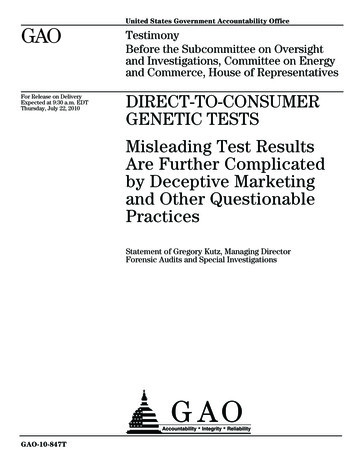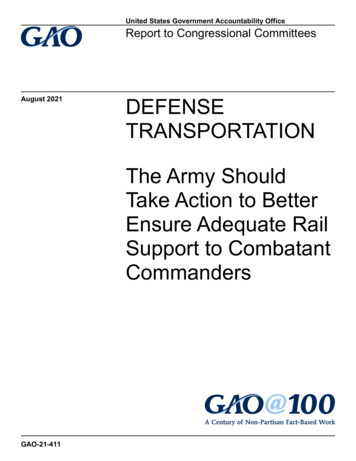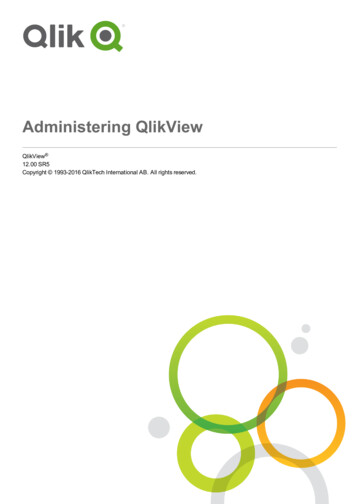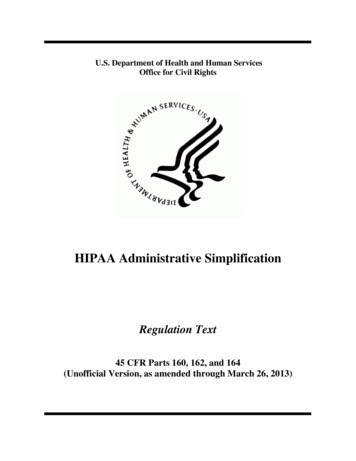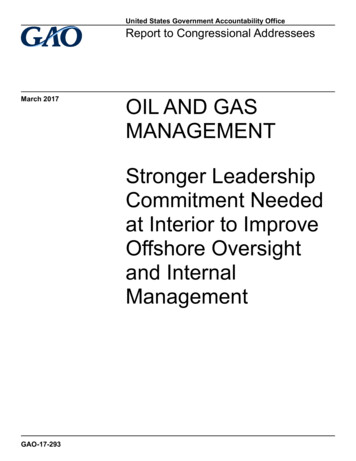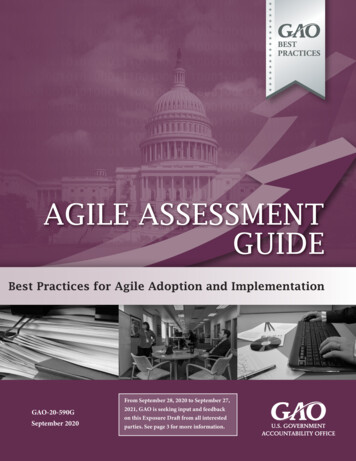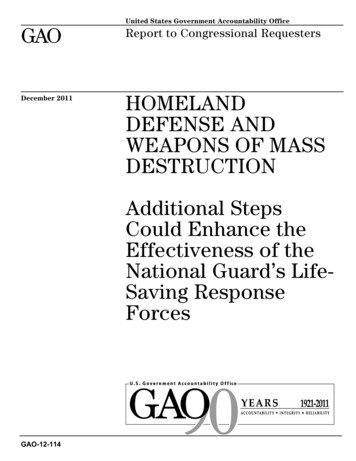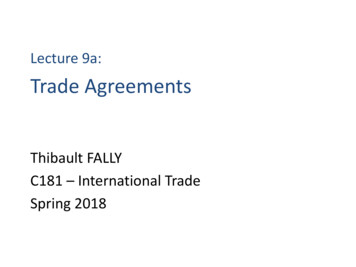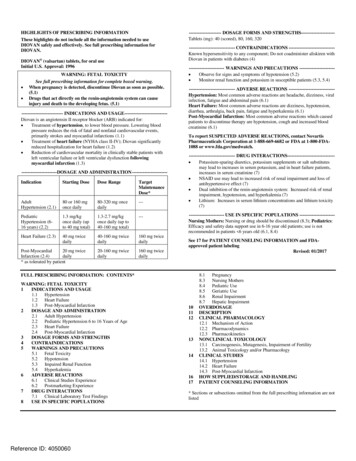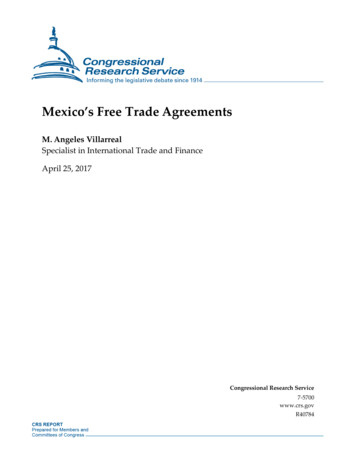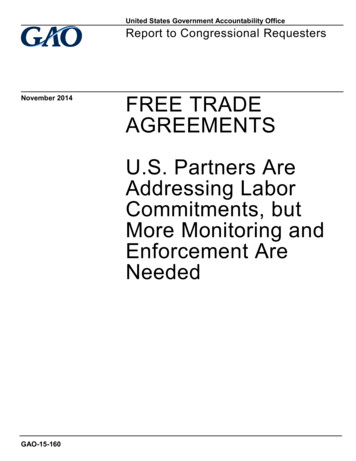
Transcription
United States Government Accountability OfficeReport to Congressional RequestersNovember 2014FREE TRADEAGREEMENTSU.S. Partners AreAddressing LaborCommitments, butMore Monitoring andEnforcement AreNeededGAO-15-160
November 2014FREE TRADE AGREEMENTSU.S. Partners Are Addressing Labor Commitments,but More Monitoring and Enforcement Are NeededHighlights of GAO-15-160, a report tocongressional requestersWhy GAO Did This StudyWhat GAO FoundThe United States has signed 14 FTAs,liberalizing U.S. trade with 20 countries.These FTAs include provisions regardingfundamental labor rights in the partnercountries. USTR and DOL, supported byState, are responsible for monitoring andassisting FTA partners’ implementation ofthese provisions.Partner countries of free trade agreements (FTA) that GAO selected—the DominicanRepublic-Central America-United States Free Trade Agreement (CAFTA-DR) and theFTAs with Colombia, Oman, and Peru—have taken steps to implement labor provisionsand other initiatives to strengthen labor rights. For example, U.S. and foreign officials saidthat El Salvador and Guatemala—both partners to CAFTA-DR—as well as Colombia,Oman, and Peru have acted to change labor laws, and Colombia and Guatemala haveacted to address violence against union members. Since 2001, U.S. agencies haveprovided 275 million in labor-related technical assistance and capacity-building activitiesfor FTA partners, including 222 million for the four FTAs GAO reviewed. However, U.S.agencies reported, and GAO found, persistent challenges to labor rights, such as limitedenforcement capacity, the use of subcontracting to avoid direct employment, and, inColombia and Guatemala, violence against union leaders.GAO was asked to assess the status ofimplementation of FTA labor provisions inpartner countries. GAO examined (1)steps that selected partner countrieshave taken, and U.S. assistance theyhave received, to implement theseprovisions and other labor initiatives andthe reported results of such steps; (2)submissions regarding possible violationsof FTA labor provisions that DOL hasaccepted and any problems related tothe submission process; and (3) theextent to which U.S. agencies monitorand enforce implementation of FTA laborprovisions and report results toCongress. GAO selected CAFTA-DR andthe FTAs with Colombia, Oman, andPeru as representative of the range ofFTAs with labor provisions, among otherreasons. GAO reviewed documentationrelated to each FTA and interviewedU.S., partner government, and otherofficials in five of the partner countries.Since 2008, the Department of Labor (DOL) has accepted five formal complaints—knownas submissions—about possible violations of FTA labor provisions and has resolved one,regarding Peru (see fig.). However, for each submission, DOL has exceeded by anaverage of almost 9 months its 6-month time frame for investigating FTA-related laborsubmissions and issuing public reports, showing the time frame to be unrealistic. Also,union representatives and other stakeholders GAO interviewed in partner countries oftendid not understand the submission process, possibly limiting the number of submissionsfiled. Further, stakeholders expressed concerns that delays in resolving the submissions,resulting in part from DOL’s exceeding its review time frames, may have contributed to thepersistence of conditions that affect workers and are allegedly inconsistent with the FTAs.Five Labor Submissions Accepted by DOL Regarding Free Trade AgreementsWhat GAO RecommendsDOL should reevaluate its submissionreview time frame and better informstakeholders about the submissionprocess. USTR and DOL shouldestablish a coordinated strategicapproach to monitoring and enforcementlabor provisions. USTR’s annual report toCongress should include moreinformation of USTR’s and DOL’smonitoring and enforcement efforts. Theagencies generally agreed with therecommendations but disagreed withsome findings, including the finding thatthey lack a systematic approach tomonitor and enforce labor provisions inall FTAs. GAO stands by its findings.View GAO-15-160. For more information,contact Kimberly Gianopoulos at (202) 5128612 or gianopoulosk@gao.gov.In 2009, GAO found weaknesses in the Office of the U.S. Trade Representative’s (USTR)and DOL’s monitoring and enforcement of FTA labor provisions. In the same year, theagencies pledged to adopt a more proactive, interagency approach. GAO’s current reviewfound that although the agencies have taken several steps since 2009 to strengthen theirmonitoring and enforcement of FTA labor provisions, they lack a strategic approach tosystematically assess whether partner countries’ conditions and practices are inconsistentwith labor provisions in the FTAs. Despite some proactive steps, they generally rely onlabor submissions to begin identifying, investigating, and initiating steps to addresspossible inconsistencies with FTA labor provisions. According to agency officials, resourcelimitations have prevented more proactive monitoring of all FTA labor provisions. As aresult, USTR and DOL systematically monitor and enforce compliance with FTA laborprovisions for only a few priority countries. USTR’s annual report to Congress about tradeagreement programs provides limited details of the results of the agencies’ monitoring andenforcement of compliance with FTA labor provisions.United States Government Accountability Office
ContentsLetter1BackgroundSelected Countries Have Taken Steps, with U.S. Assistance, toAddress FTA Labor Commitments and Other Labor Initiativesbut Have Limited Enforcement CapacityOne of Five Labor Submissions Has Been Resolved, butReporting Deadlines and Limited Public Awareness of theProcess Present ProblemsU.S. Agencies Provide Limited Monitoring, Enforcement, andReporting on FTA Labor ProvisionsConclusionsRecommendations for Executive ActionAgency Comments and Our Evaluation32464747Appendix IObjectives, Scope, and Methodology50Appendix IIReported Violence against Trade Unionists in Colombia andGuatemala55Appendix IIIU.S. Monitoring of Implementation of Other Labor Initiatives65Appendix IVStatus of Labor Submissions69Appendix VComments from the Office of the U.S. Trade Representative77Appendix VIComments from the Department of Labor92Appendix VIIGAO Contact and Staff Acknowledgments96Page i51023GAO-15-160 Labor Provisions in Free Trade Agreements
FiguresFigure 1: Labor-Related Technical Assistance Administered byU.S. Agencies under Selected Free Trade Agreements(FTA) and All Other FTAsFigure 2: U.S. DOL Labor Submission ProcessFigure 3: Free Trade Agreement (FTA) Labor SubmissionsAccepted by DOL as of July 2014Figure 4: Murders of Unionists in Colombia, 2003-2013Figure 5: Timeline and Status of Labor Submission RegardingBahrainFigure 6: Timeline and Status of Labor Submission Regarding theDominican RepublicFigure 7: Timeline and Status of Labor Submission RegardingGuatemalaFigure 8: Timeline and Status of Labor Submission RegardingHondurasFigure 9: Timeline and Status of Labor Submission RegardingPeruPage ii162426567072747576GAO-15-160 Labor Provisions in Free Trade Agreements
can Federation of Labor and Congress of IndustrialOrganizationsDominican Republic-Central America-United States FreeTrade AgreementInternational Commission against Impunity in GuatemalaDepartment of LaborDivisión de Protección de Personas y SeguridadBureau of Democracy, Human Rights, and LaborEscuela Nacional Sindicalfree trade agreementInternational Labour OrganizationBureau of International Narcotics and Law EnforcementNorth American Free Trade Agreementnongovernmental organizationServicio Nacional de AprendizajeNational Union of Tax Administration WorkersNational Superintendency of Tax AdministrationTrade Policy Staff CommitteeUnidad Nacional de ProtecciónU.S. Agency for International DevelopmentOffice of the U.S. Trade RepresentativeThis is a work of the U.S. government and is not subject to copyright protection in theUnited States. The published product may be reproduced and distributed in its entiretywithout further permission from GAO. However, because this work may containcopyrighted images or other material, permission from the copyright holder may benecessary if you wish to reproduce this material separately.Page iiiGAO-15-160 Labor Provisions in Free Trade Agreements
441 G St. N.W.Washington, DC 20548November 6, 2014The Honorable George MillerRanking MemberCommittee on Education and the WorkforceHouse of RepresentativesThe Honorable Sander M. LevinRanking MemberCommittee on Ways and MeansHouse of RepresentativesAs global economic competition has intensified, concerns in the UnitedStates that competitors’ labor practices may disadvantage U.S. workersand producers have become acute. Recent U.S. free trade agreements(FTA) contain a provision requiring partner countries to commit to respectinternationally accepted core labor rights, such as freedom of associationand the right to bargain collectively. 1 FTAs phase out barriers to tradewith particular countries or groups of countries and contain rules andother commitments to improve access for services and investment. FTAsrepresent a major component of U.S. trade policy, as the United Stateshas signed 14 FTAs with 20 countries covering, according to theDepartment of Commerce, more than 35 percent of all U.S. imports— 2.3trillion in 2013. 2 The status of the implementation of FTA labor provisions1For example, FTAs that have entered into force since February 2009 contain a provisionstating that “[e]ach Party shall adopt and maintain in its statutes and regulations, andpractices thereunder, the following rights, as stated in the ILO [International LabourOrganization] Declaration on Fundamental Principles and Rights at Work and Its Followup (1998).” For example, see United States-Colombia FTA (entered into Force May 2012),art. 17.2. According to the Department of Labor (DOL), freedom of association is the rightof workers and employers to organize to defend their interests, including for the purposeof negotiating salaries, benefits, and other conditions of work, and is a fundamental rightthat underpins democratic representation and governance; collective bargaining is anessential element of freedom of association that helps to ensure that workers andemployers have an equal voice in negotiations and provides workers the opportunity toseek to improve their living and working conditions.2As of July 2014, the United States had entered into FTAs with Australia, Bahrain,Canada, Chile, Colombia, Costa Rica, the Dominican Republic, El Salvador, Guatemala,Honduras, Israel, Jordan, South Korea, Mexico, Morocco, Nicaragua, Oman, Panama,Peru, and Singapore. The Dominican Republic-Central America-United States Free TradeAgreement (CAFTA-DR) covers six of these countries (Costa Rica, Dominican Republic,El Salvador, Guatemala, Honduras, and Nicaragua).Page 1GAO-15-160 Labor Provisions in Free Trade Agreements
is of particular relevance, as the United States is negotiating the TransPacific Partnership—a trade agreement with 11 Pacific Rim countries, inwhich the administration is seeking to negotiate high-standard laborprovisions. The effective implementation of labor provisions is alsorelevant as Congress considers renewal of the President’s lapsed TradePromotion Authority, most recently in effect from 2002 through 2007. 3In 2009, we reported significant challenges connected with theenforcement of labor provisions in four FTAs. 4 We also reported that theU.S. agencies responsible for the monitoring and implementation of laborprovisions in the FTAs in many cases engaged in only minimal oversightand assistance with FTA partner countries to address these challenges.We recommended that the Department of Labor (DOL), in consultationwith other agencies, initiate regular contact with all FTA partners’ministries of labor to review implementation of FTA labor provisions andto develop ongoing priorities and plans for technical cooperation on labormatters. We also recommended that the Office of the U.S. TradeRepresentative (USTR), in cooperation with other agencies, prepareupdated plans to implement, enforce, monitor, and report on compliancewith and progress under the FTAs’ labor provisions and that these plansshould reflect ongoing trade developments, be provided to Congress, andbe summarized in USTR’s annual trade agreements report. In 2012, bothagencies were taking actions to address the recommendations. 5As the main U.S. point of contact for all FTAs, USTR has generaloversight responsibility for commitments in FTAs. DOL is responsible formonitoring partner countries’ labor conditions and compliance with FTAlabor provisions, addressing complaints regarding violations of theseprovisions, and providing technical assistance. The Department of State3Trade Promotion Authority, previously known as “fast track” negotiating authority,established conditions and procedures under which the President could submit legislationto approve and implement trade agreements, such as FTAs, that Congress could approveor disapprove but could not amend or filibuster. See Bipartisan Trade Promotion AuthorityAct of 2002, Pub. L. No. 107-210, Div. B, § 2103, 116 Stat. 933, 1004–08.4GAO, International Trade: Four Free Trade Agreements GAO Reviewed Have Resultedin Commercial Benefits, but Challenges on Labor and Environment Remain, GAO-09-439(Washington, D.C.: July 10, 2009). Our 2009 report reviewed implementation of the U.S.FTAs with, respectively, Chile, Jordan, Morocco, and Singapore.5Additional information about U.S. agencies’ monitoring and reporting on compliance with,and progress under, FTA labor provisions is presented later in this report.Page 2GAO-15-160 Labor Provisions in Free Trade Agreements
(State) supports USTR and DOL in discharging their responsibilities andalso monitors labor conditions in each partner country. In some instances,the U.S. Agency for International Development (USAID) supports partnercountries in implementing FTA labor obligations and initiatives byadministering technical assistance projects, carried out by USAID’simplementing partners. In 2009, USTR announced that it would takesteps jointly with DOL and State to improve interagency cooperation;proactively monitor the implementation of labor provisions; and addressidentified problem areas, including foreign practices that would constituteviolations of FTA requirements. Furthermore, the President’s 2014 TradePolicy Agenda indicates that the administration will focus onimplementation of the numerous agreements into which the United Stateshas entered and that the United States will work with key trading partnersaround the world to address specific labor issues.You asked us to assess the current status of the implementation of FTAlabor provisions as well as the United States’ and trade partner countries’responses to related challenges, such as reported violence againstunionists in some partner countries. This report examines the following(see app. I for a detailed description of our scope and methodology):1) steps that selected partner countries have taken, and U.S. assistancethey have received, to implement FTA labor provisions and otherlabor initiatives and the reported results of such steps;2) complaints—known as submissions—about possible violations of FTAlabor provisions that DOL has accepted and any problems related tothe submission process; and3) the extent to which USTR, DOL, and State monitor and enforcepartner countries’ implementation of FTA labor provisions and reportresults to Congress.In addition, appendix II describes reported violence against laborunionists in selected FTA partner countries as well as steps that thecountries have taken to address such occurrences. Appendix III describesU.S. agencies’ efforts to monitor implementation of other labor initiatives.For our review, we selected four FTAs—the Dominican Republic-CentralAmerica-United States Free Trade Agreement (CAFTA-DR), the UnitedStates-Colombia Trade Promotion Agreement (Colombia FTA), theUnited States-Oman Free Trade Agreement (Oman FTA), and the UnitedStates-Peru Trade Promotion Agreement (Peru FTA). We also visited fivepartner countries—El Salvador and Guatemala, both of which arePage 3GAO-15-160 Labor Provisions in Free Trade Agreements
CAFTA-DR partners; Colombia; Oman; and Peru. We selected theseFTAs and countries in part because of the extent of known labor issues ineach country; because of the timing of the FTAs’ entry into force; and toreflect regional dispersion across Central America, South America, andthe Middle East. 6 In addition, we selected the Colombia and Peru FTAs inpart because the labor chapters in those agreements contain provisionsreflecting labor language as delineated in the May 10, 2007, BipartisanTrade Agreement on Trade Policy, popularly known as the May 10thAgreement. 7 However, the results of our review of these selected FTAsand partner countries cannot be generalized to all FTAs and partnercountries.To address our objectives, we reviewed relevant documents, includingthe labor chapters of the four selected FTAs; labor submissions receivedby DOL; labor rights reports and trade agreement reports compiled byU.S. agencies, international organizations, and FTA stakeholders; anddocuments pertaining to U.S. monitoring and enforcement plans. Inaddition, we reviewed documentation related to labor conditions in partnercountries that we obtained from partner country governments as well asfrom business associations, labor unions, the International LabourOrganization (ILO), and nonprofit organizations. We interviewedrepresentatives of these organizations; relevant foreign governmentofficials; and U.S. agency officials in Colombia, El Salvador, Guatemala,Oman, and Peru during fieldwork in those countries. We also interviewedU.S. agency representatives in Washington, D.C., and Geneva,Switzerland. 8 We collected data on U.S. funding for labor assistance6According to USTR, FTA provisions provide for the FTA’s entry into force through anexchange of formal diplomatic notes among the parties. USTR also notes that, in theUnited States, the President must first determine that the trading partner has come intocompliance with obligations that will take effect when the agreement enters into force.When an FTA enters into force, it generally means that the agreement becomes legallybinding on the parties to the agreement.7Congressional leaders and the Bush administration jointly agreed to the May 10thAgreement, resulting in a new trade policy template that calls for, among other things, (1)enforceable reciprocal obligation for the countries to adopt and maintain in their laws andpractice the five basic internationally recognized labor principles, as stated in theInternational Labour Organization (ILO) Declaration on Fundamental Principles and Rightsat Work and (2) labor obligations subject to the same dispute settlement procedures andremedies as commercial obligations.8The views expressed by these officials and organizations cannot be generalized to allofficials or organizations knowledgeable about labor provisions in the selected FTAs.Page 4GAO-15-160 Labor Provisions in Free Trade Agreements
programs in FTA partner countries from 2001 to 2013 and on reportedviolence against unionists in Colombia—the only selected FTA partnercountry with such data—and we assessed these data’s reliability byinterviewing agency officials knowledgeable about the data sources andby tracing the data to source documents. We determined that the datawere sufficiently reliable for the purposes of describing U.S. assistancefor implementation of labor provisions in FTA partner countries anddescribing general trends in reported violence against unionists inColombia. (See app. I for further details of our scope and methodology.)We conducted this performance audit from May 2013 to November 2014in accordance with generally accepted government auditing standards.Those standards require that we plan and perform the audit to obtainsufficient, appropriate evidence to provide a reasonable basis for ourfindings and conclusions based on our audit objectives. We believe thatthe evidence obtained provides a reasonable basis for our findings andconclusions based on our audit objectives.BackgroundFTA Labor Provisionsand Other Initiatives toAddress Labor ConcernsThe current and prior administrations have expressed concerns that poorlabor standards in FTA partner countries may affect workers in the UnitedStates and other parts of the world, incentivizing a global “race to thebottom” that unfairly distorts global markets and prevents U.S. businessesand workers from competing on a level playing field. According to DOL, toaddress such concerns, each FTA signed in the past decade, includingthose we selected, contains a “labor chapter” that differs in detail acrossthe FTAs but generally includes labor provisions, establishes points ofcontact for labor matters, and provides a recourse mechanism for mattersarising from the labor provisions. 9 The provisions in the labor chapters of9All of the selected FTAs contain mechanisms to address matters arising under therespective labor chapters. CAFTA-DR and the Colombia, Oman, and Peru FTAs eachinclude labor provisions that state that each party shall designate an office within its laborministry that shall serve as a contact point with the other party and with the public.Furthermore, the FTAs state that each party’s contact point shall provide for thesubmission, receipt, and consideration of communications on matters related to therespective labor chapter and shall make such communications available to the other partyand, as appropriate, to the public. While either party can request consultations regardingany matter addressed in the labor chapter, FTA dispute settlement procedures may beinvoked only under specified circumstances, which vary by FTA.Page 5GAO-15-160 Labor Provisions in Free Trade Agreements
the four FTAs that took effect most recently generally reflect the tradepolicy template created by the May 10th Agreement. 10 In FTAs that entered into force from January 2004 through January2009, including CAFTA-DR and the Oman FTA, the labor chaptercontains a provision that a party shall not fail to effectively enforce itslabor laws, through a sustained or recurring course of action orinaction, in a manner affecting trade between the parties. 11 UnderCAFTA-DR and the Oman FTA, matters related to this obligation arethe only matters under the respective labor chapters for which partiescan seek recourse through dispute settlement that may result inpossible fines and sanctions. 12 These FTAs also contain a provisionwhereby parties commit to “strive to ensure” that the labor rightsenumerated in the respective labor chapter are protected by theirlaws; however, matters arising under this provision do not haverecourse through the dispute settlement chapter of the respectiveFTA. 13 In FTAs that entered into force after January 2009, including theColombia and Peru FTAs, 14 the labor chapter includes languageechoing the May 10th Agreement that obligates each partner to adoptand maintain in its statutes, regulations, and practices certain10FTAs with Colombia, Panama, Peru, and South Korea contain language reflecting thelabor provisions of the May 10th Agreement.11United States-Singapore Free Trade Agreement (entered into force in January 2004),art. 17.2; United States-Chile Free Trade Agreement (entered into force in January 2004),art. 18.2; United States-Australia Free Trade Agreement (entered into in force January2005), art. 18.2; United States-Morocco Free Trade Agreement (entered into force inJanuary 2006), art. 16.2; CAFTA-DR (entered into force between 2006 and 2009 for thevarious countries), art. 16.2; United States-Bahrain Free Trade Agreement (Bahrain FTA)(entered into force in January 2006), art. 15.2; and Oman FTA (entered into force inJanuary 2009), art. 16.2.12CAFTA-DR, art. 16.6.7; Oman FTA art. 16.6.5.13CAFTA-DR, art. 16.1.1 and 16.6.7; Oman FTA, art. 16.1.1 and 16.6.5.14United States-Peru FTA (entered into force in February 2009), art. 17.2, 17.3; UnitedStates-Colombia FTA (entered into force in May 2012), art. 17.2, 17.3; United StatesKorea Free Trade Agreement (entered into force in March 2012), art. 19.2, 19.3; andUnited States-Panama Free Trade Agreement (entered into force in October 2012), art.16.2, 16.3.Page 6GAO-15-160 Labor Provisions in Free Trade Agreements
fundamental labor rights as stated by the ILO. 15 Although the text ofthe respective FTAs’ labor chapters varies, this language generallyrelates to, for example, the rights to freedom of association andcollective bargaining and the elimination of compulsory or forcedlabor. The labor chapters of these FTAs also obligate the parties notto fail to effectively enforce these labor laws in a manner affectingtrade between the parties. Pursuant to the labor chapters of theseFTAs, if consultations fail, the parties can seek to resolve mattersarising under the labor chapters by pursuing recourse through therespective FTAs’ dispute settlement chapters, which may result inpossible fines and sanctions. 16In addition, other labor initiatives—one known as the White Paper 17 andthe other titled Colombian Action Plan Related to Labor Rights (LaborAction Plan) 18—were developed in the context of CAFTA-DR and theColombia FTA, respectively. 19White Paper. Before Congress enacted implementing legislation forCAFTA-DR, 20 a group of vice ministers responsible for trade and laborin the partner countries developed the White Paper to address laborconcerns in Central America and the Dominican Republic. The White 15International Labour Organization, Declaration on Fundamental Principles and Rights atWork and Its Follow-Up (1998), declaration/lang--en/index.htm, accessed August 18, 2014. The principles and rightsstated by the ILO are (1) freedom of association and the effective recognition of the rightto collective bargaining, (2) the elimination of all forms of forced or compulsory labor, (3)the effective abolition of child labor, and (4) the elimination of discrimination in respect ofemployment and occupation.16United States-Peru FTA, art. 17.7; Colombia FTA, art. 17.7; United States-Korea FreeTrade Agreement, art. 19.7; and United States-Panama Free Trade Agreement, art. 16.7.17Working Group of the Vice Ministers Responsible for Trade and Labor in the Countriesof Central America and the Dominican Republic, The Labor Dimension in Central Americaand the Dominican Republic: Building on Progress: Strengthening Compliance andEnhancing Capacity (April 2005), accessed June 7, 2013, olombian Action Plan Related to Labor Rights (April 7, 2011), accessed May 29, 2013,http://www.ustr.gov/webfm send/2787.19These labor initiatives were created outside an FTA framework.20Dominican Republic-Central America-United States Free Trade AgreementImplementation Act, Pub. L. No. 109-53, 119 Stat. 262 (Aug. 2, 2005).Page 7GAO-15-160 Labor Provisions in Free Trade Agreements
Paper detailed six areas of focus and included recommendations toenhance the implementation and enforcement of labor standards andto strengthen the region’s labor institutions. 21 According to DOL, theU.S. government did not participate in preparing or negotiating theWhite Paper’s recommendations. The ILO Verification Project, fundedby DOL, was created to monitor implementation of the White Papercommitments and released verification reports every 6 monthsbetween 2007 and 2010. U.S. Agencies’Responsibilities Related toMonitoring Implementationof FTA Labor ProvisionsLabor Action Plan. Colombia and the United States agreed in 2011to the Labor Action Plan, in furtherance of Colombia’s commitment toprotect internationally recognized labor rights, prevent violenceagainst labor leaders, and prosecute the perpetrators of suchviolence. The plan listed nine issue areas to strengthen labor rightsthat Colombia was required to address before the FTA could receivecongressional approval. 22 USTR and DOL are jointly responsible formonitoring Colombia’s ongoing progress in fulfilling theserequirements.USTR, DOL, and State have key responsibilities related to monitoringpartner countries’ implementation of FTA labor provisions. These rolesinvolve both discrete and shared responsibilities that require both formaland informal coordination. USAID has provided funding for cooperativeprojects to improve labor capacity. USTR. The U.S. Trade Representative is the President’s principaladviser and spokesperson on trade and has lead responsibility fornegotiating trade agreements, including FTAs, as well as for21Under the White Paper, the labor ministers of the six CAFTA-DR countries agreed toaddress the following priority areas: (1) labor law and implementation, (2) budget andpersonnel needs of the labor ministries, (3) strengthening the judicial system for labor law,(4) protections against discrimination in the workplace, (5) worst forms of child labor, and(6) promoting a culture of compliance.22The nine areas that Colombia agreed to address under the Labor Action Plan were (1)creation of a specialized Ministry of Labor; (2) criminal code reform; (3) prohibiting themisuse of cooperatives; (4) preventing the use of temporary service agencies tocircumvent labor rights; (5) criminalizing the use of collective pacts to undermine the rightto organize and bargain collectively; (6) collecting and disseminating information on thedefinition of essential services; (7) seeking the ILO’s assistance in implementing the LaborAction Plan and working with the ILO to strengthen its presence, capacity, and role inColombia; (8) reforming protection programs; and (9) criminal justice reforms.Page 8GAO-
Page ii GAO-15-160 Labor Provisions in Free Trade Agreements . Figures Figure 1: Labor-Related Technical Assistance Administered by U.S. Agencies under Selected Free Trade Agreements (FTA) and All Other FTAs 16 Figure 2: U.S. DOL Labor Submission Process 24 Figure 3: Free Trade Agreement (
